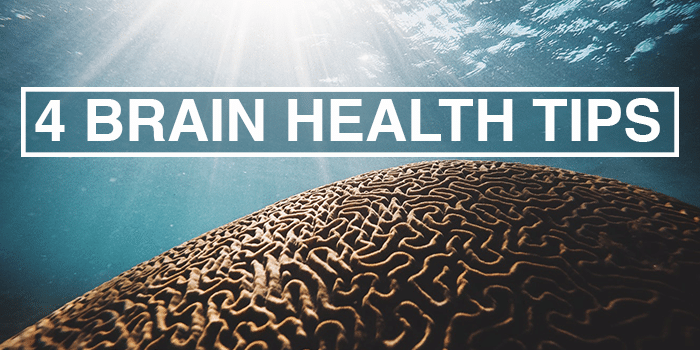June 27, 2019
Tips For Good Brain Health
The health of your brain is essential to your overall physical, mental, and emotional health. In honor of Brain Health Month, here are four THINK tips of how you can improve the health of your brain while you are simultaneously working on improving the health of your body…
- Practice meditation daily to strengthen your “mind-muscle”. Anyone who has sat in on my lectures knows how much I love talking about meditation and advocate for practicing the skill daily. There is a good reason for it, like the wealth of science that shows amazing neurological benefits of meditation that are confirmed by fMRI and EEG scans! The measurable changes include changes to grey matter volume in the brain, increased cortical thickness in the hippocampus (governs learning and memory), and enhanced connectivity between brain regions. These changes in the brain structure result in a decrease in one’s experience of anxiety and depression, improved attention and concentration, reduced stress, better self-regulation, and overall feelings of peace and wellbeing. All of these benefits come from 5-20 minutes of daily meditation, with no negative side effects or the expenses that come with pharmaceutical medications. To get started, download a meditation app such as Calm, Insight Timer, or Headspace and use their guided meditations to help you begin to reap the benefits of this simple, ancient practice. Or, search for a meditation class or group in your area that you can integrate into a regular part of your weekly self-care routine.
- Use essential oils to improve brain function!
Science now shows how various essential oils improve brain function in a variety of ways. When the scent hits your old factory senses, it causes a chemical reaction to unfold in the brain and body which results in a number of positive benefits. There are LOTS of essential oil options, and it can be a bit overwhelming to know where to start. Here are some oils that you can get started with that have science backing up their benefit for brain health: Use peppermint oil to improve cognitive performance and reduce mental fatigue. Frankincense oil can be used to increase blood flow to the brain and reduce inflammation. Meanwhile, sage oil has been demonstrated to help improve memory! Besides the brain benefits, essential oils smell pleasant and are a nice addition to a room or office. Use an essential oil diffuser in your spaces, or find topical oils that you can apply to your wrists, neck, and feet.
- Improve your mood and thoughts to improve your mind.
Did you know that a negative mood has been shown to affect memory and the brain’s ability to create new neural connections? A more positive mood, on the other hand, has been shown to improve one’s cognitive abilities, including being more alert and productive. Feeling happy stimulates the growth of nerve connections and neural networks, which reinforces the frequency of happier thoughts and feelings… it’s a happy cycle! Thinking happy thoughts releases serotonin, creating a greater sense of wellbeing. So in the words of Peter Pan, it’s time to “Think happy thoughts”! Become aware of the thoughts you are thinking that are contributing to your feeling down, frustrated, or moody. Simply observe the thoughts nonjudgmentally and then ask yourself if there is a more neutral, helpful, or adaptive way to think about the situation or person, including if it’s about yourself. Improving your thoughts to be more positive also means improving your self-talk. It is important to note that this does not mean that you should ignore or repress uncomfortable or negative feelings. Our emotions are important messengers that need to be acknowledged and processed as part of a healthy and normal human experience. However, the difference is that you want to “feel and free” your emotions rather than sit and stew in them by ruminating on negative thoughts that perpetuate the negative feelings. Step one is to acknowledge what “is” for you at the moment, whether it’s a negative thought or feeling, and then step two is to work on shifting the thought or feeling to be more pleasant.
- Increasing social connection increases neural connections.
Studies show that people who have the most social interaction experience slower rates of memory decline and that having supportive relationships can significantly protect against the effects of cognitive impairments as one ages. What does your social network and support system look like? When was the last time you got together with family or friends and enjoyed their company? Often one’s relationships can be a source of stress, depending on the history and nature of the relationships. Regardless, can you put any tensions aside and just have fun together? If yes, then get out there and have fun! Go to the movies or a show, attend a fair or festival, go camping or hiking together, etc. The options are endless. If no, then try to expose yourself to opportunities to meet new people and socialize, such as with a community group, social club, or volunteer organization. What matters is that you find people to laugh with, connect with, share moments with, and allow you to feel a sense of belonging.
 5-star Fitness
5-star Fitness
 5-star Fitness
5-star Fitness
